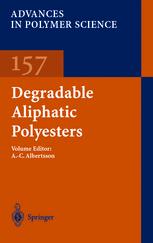

Most ebook files are in PDF format, so you can easily read them using various software such as Foxit Reader or directly on the Google Chrome browser.
Some ebook files are released by publishers in other formats such as .awz, .mobi, .epub, .fb2, etc. You may need to install specific software to read these formats on mobile/PC, such as Calibre.
Please read the tutorial at this link: https://ebookbell.com/faq
We offer FREE conversion to the popular formats you request; however, this may take some time. Therefore, right after payment, please email us, and we will try to provide the service as quickly as possible.
For some exceptional file formats or broken links (if any), please refrain from opening any disputes. Instead, email us first, and we will try to assist within a maximum of 6 hours.
EbookBell Team

0.0
0 reviewsA renewed interest in aliphatic polyesters has resulted in developing materials important in the biomedical and ecological fields. Mainly materials such as PLA and PCL homopolymers have so far been used in most applications. There are many other monomers which can be used. Different molecular structures give a wider range of physical properties as well as the possibility of regulating the degradation rate. By using different types of initiators and catalysts, ring-opening polymerization of lactones and lactides provides macromolecules with advanced molecular architectures. In the future, new degradable polymers should be able to participate in the metabolism of nature. Some examples of novel polymers with inherent environmentally favorable properties such as renewability and degradability and a series of interesting monomers found in the metabolisms and cycles of nature are given.